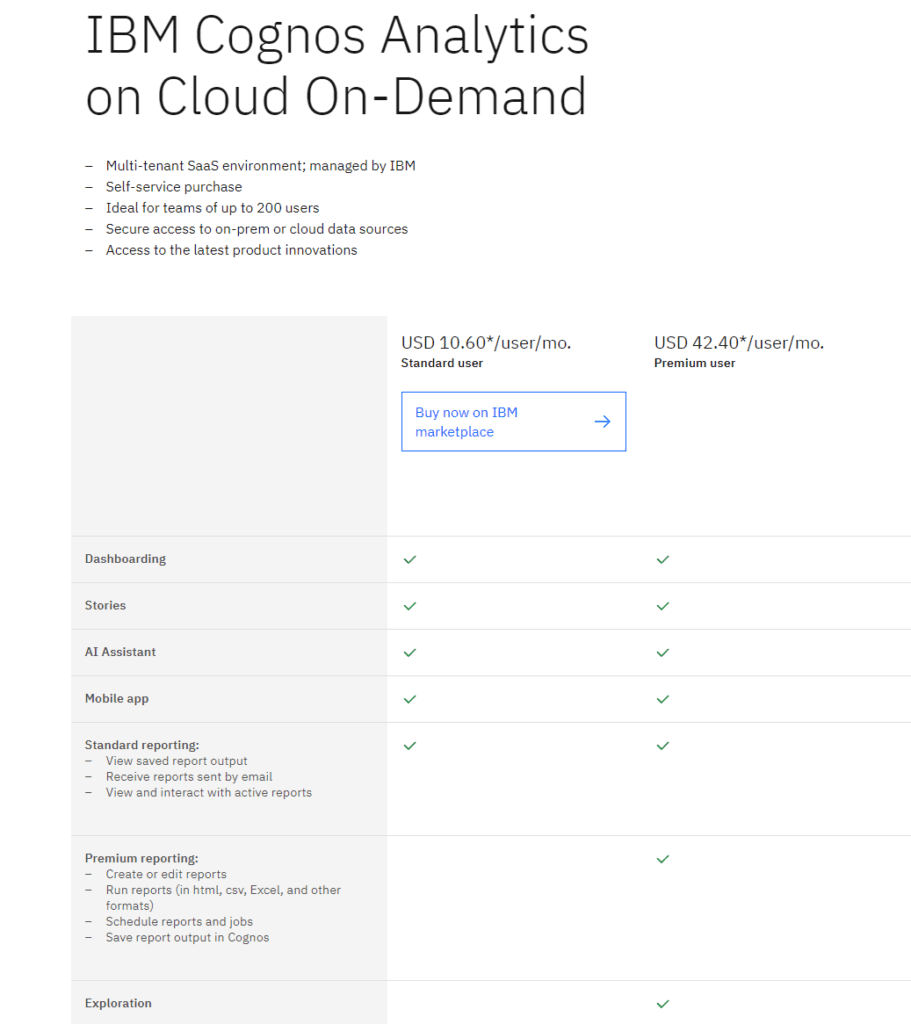In today’s data-driven world, the right analytics tool isn’t just a nice-to-have; it’s the backbone of informed decision-making. Enter the arena two heavyweights: IBM Cognos Analytics and Oracle Analytics Cloud. Both platforms promise to turn data into insights, but which one will be your champion? Let’s dive into this head-to-head comparison, cutting through the jargon to help you decide which tool best suits your needs. We’ll start by exploring a key battlefield
| IBM Cognos Analytics | Oracle Analytics Cloud |
|---|---|
 |  |
| G2 Score – 4.0 out of 5 stars | G2 Score – 4.0 out of 5 stars |
| TrustRadius Score – 8.1/10 | TrustRadius Score – 8.2/10 |
User Experience (UX) and Ease of Use
In the quest for data insights, the journey is just as important as the destination. A tool that’s powerful yet perplexing can turn what should be a sprint into a marathon. Here’s how IBM Cognos Analytics and Oracle Analytics Cloud stack up in terms of getting you to insights smoothly and swiftly.
IBM Cognos Analytics: Navigating with Guidance
IBM Cognos Analytics is like a seasoned guide in the world of data exploration. It’s designed with the intention of making advanced analytics accessible to users across the spectrum of technical expertise. With a revamped interface that prioritizes user-friendliness, Cognos offers a dashboard rich with drag-and-drop features that allow users to assemble and visualize data with minimal fuss.
The platform also incorporates AI-driven insights, offering users smart recommendations for visualizations based on the data they’re working with. This not only streamlines the process of creating reports but also educates users on how to effectively communicate their findings. However, it’s worth noting that the depth and breadth of Cognos’ capabilities mean there’s still a learning curve, especially for those diving into more advanced features.
Oracle Analytics Cloud: Empowering Data Democracy
Oracle Analytics Cloud takes a slightly different approach, aiming to democratize data analysis through a cloud-based, all-in-one platform that caters to both novice users and data scientists alike. The emphasis here is on self-service analytics, with Oracle providing a suite of tools that encourage exploration and collaboration.
Oracle Analytics Cloud shines with its intuitive data visualization capabilities, allowing users to quickly create compelling visuals and interactive dashboards. Machine learning and AI are baked into the experience, offering predictive analytics and automated insights that guide users towards uncovering hidden aspects of their data.
One of Oracle’s standout features is its natural language processing (NLP), enabling users to query their data using everyday language. This significantly lowers the barrier to entry for users who may not be well-versed in data query languages.
Data Integration and Management
IBM Cognos Analytics: The Integration Architect
IBM Cognos Analytics stands as a formidable architect in the realm of data integration and management, constructing bridges between disparate data sources to create a unified analytical foundation. It is designed with the enterprise in mind, offering deep capabilities to not only aggregate and integrate data from a variety of sources—including databases, spreadsheets, and external APIs—but also to ensure that this data is accurate, consistent, and ready for analysis.
The platform provides a comprehensive suite for data management, allowing users to model, cleanse, and enrich data within a governed framework that maintains data integrity across the organization. Cognos Analytics emphasizes the importance of a single source of truth, ensuring that all users, regardless of their technical expertise, can rely on the same accurate and timely data for their reporting and analysis needs.
Furthermore, Cognos Analytics leverages advanced metadata management tools, enabling organizations to create a common business language and unified data models that streamline reporting and analytics processes. This approach not only simplifies data access and analysis but also reinforces data governance practices, crucial for compliance and data privacy standards.
Oracle Analytics Cloud: The Agile Integrator
Oracle Analytics Cloud charts a different course, emphasizing agility and cloud-native integration in its approach to data integration and management. It thrives in environments where speed and flexibility are paramount, offering a suite of tools that enable rapid connection to a wide array of data sources, particularly those hosted in the cloud. Oracle’s solution is built to effortlessly blend data from traditional databases, cloud applications, and big data sources, providing a seamless experience for users looking to quickly derive insights from their data.
One of the key strengths of Oracle Analytics Cloud is its self-service capabilities, which empower users to perform their own data integration tasks without the need for extensive IT involvement. This democratization of data access and integration accelerates the analytics process, enabling businesses to respond more swiftly to market changes and opportunities.
Moreover, Oracle Analytics Cloud provides robust data preparation features, including automated data cleansing and enrichment processes that ensure data quality without sacrificing agility. These features, combined with Oracle’s powerful cloud infrastructure, offer scalable and efficient data management solutions that support dynamic business environments.
Scalability and Performance
The ability of an analytics platform to scale effectively and maintain high performance under varying loads is a testament to its robustness and suitability for enterprise-level operations. Here’s how IBM Cognos Analytics and Oracle Analytics Cloud measure up in these critical dimensions.
IBM Cognos Analytics: Built for Enterprise Scale
IBM Cognos Analytics is designed with scalability at its core, catering to the needs of large enterprises that demand a high level of data processing power and performance. It supports both horizontal and vertical scaling, allowing organizations to increase their analytics capacity by adding more servers or by enhancing existing server capabilities. This flexibility ensures that Cognos Analytics can handle growing data volumes and user counts without a significant degradation in performance.
Moreover, IBM has optimized Cognos Analytics for high performance, incorporating advanced data caching techniques, efficient query processing, and load balancing features. These optimizations help reduce the time it takes to generate reports and dashboards, even as the complexity of data and analytics tasks increases. The platform’s robust architecture ensures that performance is maintained across a wide range of analytics activities, from ad hoc querying to complex report generation.
Oracle Analytics Cloud: Agile and Cloud-Optimized Performance
Oracle Analytics Cloud takes advantage of its cloud-native design to offer scalable and high-performing analytics capabilities. The platform leverages Oracle’s powerful cloud infrastructure, which provides automatic scalability and elastic computing resources. This means that as the demand for analytics processing increases, Oracle Analytics Cloud can dynamically allocate additional resources to maintain performance levels, a feature particularly beneficial for handling unpredictable workloads and data spikes.
The platform also emphasizes speed and efficiency, with a focus on delivering real-time insights and rapid report generation. Oracle’s use of in-memory technologies and optimized query processing ensures that users can access and analyze their data quickly, facilitating timely decision-making. Furthermore, Oracle Analytics Cloud benefits from continuous updates and enhancements from Oracle, ensuring that the platform remains on the cutting edge of performance optimization techniques.

Related: Check out our free SEO suite

Customer Support and Community Resources
The accessibility, responsiveness, and expertise of customer support, alongside a vibrant user community, can transform the analytics tool experience from frustrating to empowering. Here’s how IBM Cognos Analytics and Oracle Analytics Cloud stand in these areas.
IBM Cognos Analytics: Comprehensive Support Backed by Expertise
IBM Cognos Analytics benefits from IBM’s extensive support infrastructure. Users have access to a wide range of support options including dedicated support teams, extensive documentation, online training resources, and a global network of IBM partners. IBM’s support is known for its responsiveness and depth of expertise, providing valuable assistance for both technical issues and strategic advice on best use practices.
Moreover, the Cognos Analytics user community is both active and experienced. Forums, user groups, and social media channels offer a platform for users to share insights, solve problems collectively, and exchange tips and best practices. IBM also facilitates a rich ecosystem of learning resources, including webinars, tutorials, and case studies, helping users to continually advance their knowledge and skills with the platform.
Oracle Analytics Cloud: Agile Support with a Focus on Cloud Innovation
Oracle Analytics Cloud users benefit from Oracle’s robust cloud support structure. This includes 24/7 access to technical support, a comprehensive knowledge base, and a proactive support system that leverages cloud diagnostics and machine learning to predict and resolve issues before they impact users. Oracle’s support is designed to be agile and cloud-focused, reflecting the dynamic and scalable nature of its analytics platform.
The community surrounding Oracle Analytics Cloud is vibrant and growing, with Oracle fostering a collaborative environment through forums, user conferences, and social media engagement. The Oracle Analytics Cloud community benefits from shared cloud-based insights, innovative use cases, and a wide range of online resources aimed at promoting best practices and innovative uses of the platform. Oracle’s emphasis on cloud analytics encourages a forward-looking community that actively explores and shares new ways to leverage cloud data for business intelligence.
Cost and Investment
The total cost of ownership (TCO) and the expected ROI from an analytics platform are critical considerations that encompass not only the initial licensing or subscription fees but also ongoing costs related to deployment, maintenance, and scaling.
IBM Cognos Analytics: Comprehensive but Cost-Effective

IBM Cognos Analytics offers a range of pricing options designed to accommodate the diverse needs and sizes of businesses. The platform can be deployed on-premises or on the cloud, with pricing models that vary accordingly. For on-premises deployment, there might be significant upfront costs associated with hardware and infrastructure setup. However, this investment is balanced by Cognos Analytics’ comprehensive suite of BI tools, which can reduce the need for additional software purchases.
The cloud-based deployment of Cognos Analytics operates on a subscription model, offering flexibility and scalability while minimizing the need for extensive internal IT resources. Subscription plans can vary based on the number of users and the depth of functionality required, allowing organizations to scale their use of the platform as their business grows.
IBM also highlights the ROI potential of Cognos Analytics, emphasizing its capacity to improve decision-making efficiency, uncover revenue opportunities, and optimize operational costs through its advanced analytics capabilities. These benefits, while sometimes difficult to quantify upfront, can significantly outweigh the initial and ongoing financial investment in the platform.
Oracle Analytics Cloud: Value Through Flexibility and Scalability

Oracle Analytics Cloud is positioned as a cost-effective, cloud-native solution that offers substantial value through its flexible pricing and scalability. The platform is available exclusively on a subscription basis, which includes regular updates and access to Oracle’s cloud infrastructure. This model allows for predictable budgeting and the ability to adjust expenses based on current needs, reducing the financial risk associated with fluctuating demand for analytics resources.
Oracle’s pricing strategy is designed to be competitive, offering various tiers based on usage, data volume, and the number of users. This tiered approach ensures that small to medium-sized businesses can access powerful analytics capabilities without committing to enterprise-level investment, while larger organizations can benefit from volume discounts.
The ROI from Oracle Analytics Cloud is anchored in its ability to deliver insights rapidly, foster innovation through accessible data analysis, and drive business agility. The cloud-based nature of the platform also offers savings on IT infrastructure and maintenance costs, contributing to a lower TCO over time.
Conclusion
IBM Cognos Analytics has positioned itself as a robust, enterprise-level solution, offering deep and comprehensive analytics capabilities. Its strength lies in handling complex data environments and delivering extensive reporting and visualization options, all while ensuring data security and governance. It’s an ideal choice for large organizations requiring a powerful analytics tool that can integrate seamlessly with existing systems and scale to meet the demands of enterprise-wide data analysis.
Oracle Analytics Cloud, with its flexible, cloud-native architecture, offers a compelling proposition for organizations prioritizing agility, cloud integration, and cost efficiency. It excels in providing intuitive data visualization and real-time analytics capabilities, catering to businesses at various stages of their cloud journey. Oracle Analytics Cloud is particularly suitable for mid-sized to large enterprises looking for a scalable, subscription-based analytics solution that can adapt to changing needs and foster a data-driven culture.
Read Next:
- Utilizing A/B Testing with SEO Analytics for Startup Optimization
- Tracking Startup SEO Success through Rank Tracking Tools
- Utilizing SEO Analytics to Optimize Startup Site Structure
- Measuring Video Content Performance through SEO Analytics‘
- 31+ Top Social Media Management tools Compared! (2023)






















Comments are closed.